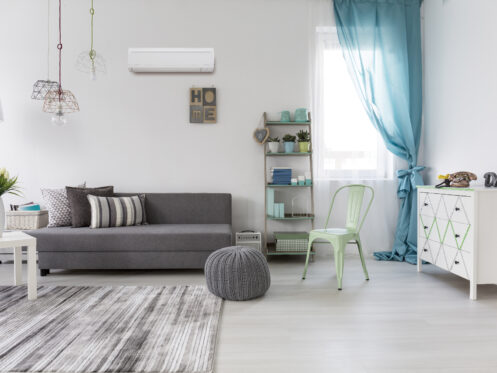Heat pumps are one of the newer residential HVAC systems that offer exceptional energy efficiency ratings and convenience. While you’ve likely heard of them, you may not yet understand how they’re able to provide both cooling and heating. Fortunately, learning more about these superior systems can help you decide if it’s time to upgrade your comfort with an improved heat pump.
What Is a Heat Pump?
Heat pumps are modern HVAC systems that utilize two components, advanced refrigeration methods and electricity to provide heating and cooling. They come in a variety of different types including air-source, water-source and ground-source. The condensing unit, which is located outside, helps to move air between your home and your local environment. Also called handlers, these units are attached to your walls right below the ceiling.
Heat pumps are often referred to as mini-splits or ductless systems. They don’t require ductwork and instead connect the outdoor and indoor units via a refrigerant line. This also helps to minimize the need for invasive installation or construction.
What Are the Different Types of Heat Pumps?
Air-source heat pumps are the most common option for the average residential building. This type of system pulls heat from the air around your home and transfers it inside. During the summer, it reverses its process, removing heat from the inside and shifting it outside. Air-source systems used to struggle in colder climates but have since been upgraded to provide reliable heating even in freezing conditions.
Ground-source heat pumps utilize the heat stored below your home. These systems require a series of pipes to be buried deep underground. While ground-source options are environmentally friendly and offer increased comfort, they tend to cost more initially. They may also not be the best system for you based on your location, soil composition and the overall size of your yard.
Finally, water-source heat pumps connect directly to a nearby lake or river. They transport water through a system of pipes to remove the heat before returning the water back to the source. They’re just as versatile as other systems, but they require a large nearby aquifer.
What Are the Benefits of Heat Pumps?
Heat pumps primarily require electricity, which has a higher efficiency rate than gas or oil. These HVAC systems only need power to turn on a few key components like the two fans, internal pump and compressor. This means they provide several units of heating and cooling per single unit of electricity.
Along with their superior efficiency, they don’t cost much to run every month. They can easily take the place of both your furnace and air conditioner, saving you from having to maintain and repair two separate systems. Heat pumps are also more eco-friendly and will reduce your home’s carbon footprint.
They’re flexible, don’t burn any fossil fuels and will have a huge beneficial impact on your long-term costs. One of the best benefits is the improved safety. As these systems don’t use natural gas, you never have to worry about carbon monoxide leaking into your home.
What Are the Potential Cons of Heat Pumps?
These systems also have a few disadvantages like higher initial installation costs. If you only plan to use your heat pump to heat your home, then they typically cost more than a traditional furnace. However, heat pumps are more likely to be worth the extra cost if you intend to use them all year round.
They will also increase your electricity usage and are susceptible to local rate hikes. It’s possible your electricity may cost more than your gas or oil. During a power outage, you may lose your heating or cooling unless you have a generator. Finally, depending on your climate, a heat pump may not be able to efficiently extract enough heat to keep your home warm.
How Do Heat Pumps Function?
Heat pumps use electricity as well as a chemical refrigerant to transport heat from one place to another. When you need heat, the system extracts it from the outside air and transfers it inside via your coolant. The pressurized refrigerant heats up and turns into a gas inside the pipes. The heat pump then pushes air over this refrigerant so it can disperse the heat inside. The process repeats after the refrigerant cools down. During the summer, heat is pulled from inside the home and released outside.
The external condenser processes the air before transporting it to your internally mounted handler or cassette. You can control your handler’s temperature via your thermostat or remote control. If you’re not interested in the traditional wall handler, you can also opt for ceiling fixtures or even standing options.
Can I Keep My Home Warm With Just a Heat Pump?
You may be able to heat your home with a heat pump alone if you live in a mild or warmer climate. It’s often recommended to invest in a backup or secondary heat source if you expect weeks or months of prolonged cold. You should also account for the quality of your insulation, your home’s size and your desired temperature. All of these factors can increase your necessary heating, which will make it harder to only use a heat pump.
Do Heat Pumps Stop Working When It’s Too Cold?
Unfortunately, due to previous models, heat pumps have a reputation for not working well in colder environments. While this used to be true in the past, major advancements have been made to improve the versatility of these great HVAC systems. Different heat pump models have varying cold ratings that describe how well they work in extremely hot or cold temperatures.
Heat pumps are typically described by their overall heating or cooling output. For example, during the winter, you want a system that can reach 100% output at your lowest local temperature. If your city’s temperature sinks outside the heat pump’s ideal range, it will have to work harder to produce enough heating. This can increase your costs and result in unnecessary wear and tear.
Luckily, many modern heat pumps can function well even in the negatives. It’s important to choose a system that will meet your personal and environmental needs. In some cases, you may need a backup heat source installed to ensure you stay warm. Guarantee ideal heat pump results by always working with a trained HVAC professional who has access to the best brands and models.
Superior HVAC Experts in Garland
On Time Experts is an experienced indoor comfort company that provides great residential services in Garland, TX and the surrounding areas. Since 1981, our experts have strived to guarantee your complete satisfaction. We’re thrilled to be able to offer same-day service to ensure you have expert help no matter your emergency. Count on our technicians to repair or maintain your heat pump, furnace, air conditioner or water heater. We can also replace your thermostat, improve your indoor air quality or take care of your plumbing repairs. Our team always treats our customers like family by delivering fast, friendly and affordable HVAC service.
Contact On Time Experts today to ask about our selection of heat pumps in Garland.

